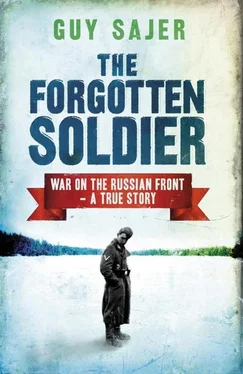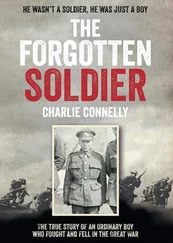We would have to fight again. Against whom and what? We knew that we no longer had any courage, and that nothing could lead us to hope any more. Despite Anglo-American cries of victory, there was no longer any opposition to the imposing materiel they had fabricated for nothing. No victory is possible over men who have died toward everything.
We had reached the banks of the Elbe, and were lying stretched out on the grass beside a small road which led to Lauenburg. British troops were in the sector, and we were supposed to try to react.
An older man was devouring the substance which fate still saw fit to deposit in our mess tins. Hals was a short way off, his eyes vacant, as he pondered imponderables. The older fellow did not seem too depressed. He muttered some barely audible words to me: “With a little luck, the war should be over for us in a few days.”
What did he mean? I knew that when a war ended for soldiers on the side that lost it usually meant a small brownish hole in the head or the chest.
“I don’t mean that,” the other said. “We’ll be prisoners — you’ll see. That’s not so grand either, but it’s better than bombing and starvation. You’ll see. These fellows aren’t muzhiks. They’re really not so bad.”
The night passed. It was mild, almost warm. We sat on the damp grass of the bank beside the road. Massive flights of planes growled invisibly through the starry sky. But nothing could interfere with our habit of half sleep, which we had perfected during three years of enforced watchfulness.
Toward three o’clock in the morning, we heard the roar of artillery somewhere to the north, and the sky was lit by flashes of light. The whole episode lasted for about forty-five minutes, during which our half sleep continued without interruption.
Daybreak came early, and a light spring sun rose over the horizon. A small battered car appeared on the road, bumping over the broken surface. The car was brown, and was occupied by three fellows whose uniforms were quite different from ours.
We watched as three brick-red faces beneath unusually large helmets drew closer to us. The owners of the faces appeared to be enjoying their morning outing.
It was my first encounter with Englishmen — the first three. To have fired at these cheerful individuals would have been a criminal act; however, some bastard in our group did fire — twice — at their heads. The car — a jeep — skidded into a panicky half turn which was slow enough to give us ample time to wipe them out.
The old man beside me roared with anger at the young fellow who had just done his duty, explaining that this ill-considered gesture risked bringing in motorized troops to attack us, against which we would have no defense. A startled hauptmann almost intervened, but saw that there was no point, and went back to stand beside his gunner.
An hour later, we heard the sound of several motors to the north of us: the old man’s prediction was coming true. A reconnaissance plane flew over, directing the fire with considerable precision to the road beneath our bank. Clinging to the ground like treads, we crawled up the hollow of a small valley, thus escaping some fifty mortar shells, which would have inflicted heavy losses.
The English must have decided that further resistance would be limited to a few isolated shots, and sent four half-tracks after us. We watched with a certain anguish as they climbed over the bank. Two of our men stood up, with their hands raised. The Eastern Front had never seen anything like that. We wondered what would happen next. Would English machine guns cut them down? Would our leader shoot them himself, for giving up like that? But nothing happened. The old man, who was still beside me, took me by the arm, and whispered: “Come on. Let’s go.”
We stood up together. Others quickly followed us. Hals came over and stood by me without even thinking of raising his hands. We walked towards the victors with pounding hearts and dry mouths. This was the only time I was ever afraid of the Western Allies, and I had provoked the fear myself.
We were roughly jostled together, and shoved into place by English soldiers with vindictive faces. However, we had seen worse in our own army, particularly in training under Captain Fink. The roughness with which the English handled us seemed comparatively insignificant, and even marked by a certain kindness.
In this way, I laid down the arms and insignia of my second country, and the war ended for me and for my comrades.
To humiliate us, they made us stand in the sturdy trucks which brought the relief of their victory to our faltering ranks. The closed, flushed faces of the English continued to reflect their non-comprehension of the smiling remarks which emerged from our famished faces. Hals even received a slap in the face from an English noncom, without much of an idea of what had happened to him. He had simply been comparing our easy ride as prisoners to our forced marches in the East.
Then we met the other allies, tall men with plump, rosy cheeks, who behaved like hooligans, but hooligans who had been nicely brought up. Their bearing was casual, and seemed to be designed to give them the opportunity to roll their hips and shoulders. Their uniforms were made of soft cloth, like golfing clothes, and they moved their jaws continuously, like ruminating animals. They seemed neither happy nor unhappy, but indifferent to their victory, like men who are performing their duties in a state of partial consent, without any real enthusiasm for them.
From our filthy, mangy ranks, we watched them with curiosity. It seemed that we, in the ranks of the defeated, were happier than these children, for whom Paradise itself had no value. They seemed rich in everything but joy — a reassuring spectacle which reconciled us with humanity.
The Americans also humiliated us as much as they could — which seemed perfectly normal. They put us in a camp with only a few large tents, which could shelter barely a tenth of us. Even in prison, the Wehrmacht continued to organize itself. As at Kharkov, or on the Dnieper, at Memel, or at Pillau, or in the black depths of winter on the steppe, space in the tents was reserved for the sick and feeble.
In the center of the camp, the Americans ripped open several large cases filled with canned food. They spread the cans onto the ground with a few kicks, and walked away, leaving the division and distribution up to us. Everyone received a share. The food was so delicious that we forgot about the driving rain, which had turned the ground into a sponge. The packets of powdered orangeade and lemonade seemed the height of luxury, and collecting rainwater in the folds of our jackets to mix with them a gay, even joyous distraction. From their shelters, the Americans watched us and talked about us. They probably despised us for flinging ourselves so readily into such elementary concerns, and thought us cowards for accepting the circumstances of captivity — the distribution of food in the rain, for instance. Wasn’t our condition as prisoners enough in itself to make us walk in silence, with that unbearable air which men have when their pride has been damaged? We were not in the least like the German troops in the documentaries our charming captors had probably been shown before leaving their homeland. We provided them with no reasons for anger; we were not the arrogant, irascible Boches, but simply underfed men standing in the rain, ready to eat unseasoned canned food; living dead, with anxiety stamped on our faces, leaning against any support, half asleep on our feet; sick and wounded, who didn’t ask for treatment, but seemed content simply to sleep for long hours, undisturbed. It was clearly depressing for these crusading missionaries to find so much humility among the vanquished.
In due course, we were sent on to Mannheim, where we passed through a large processing center.
Читать дальше












